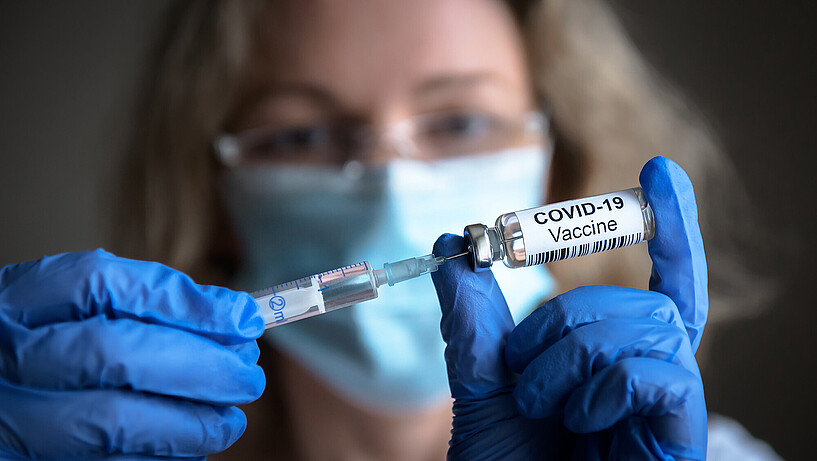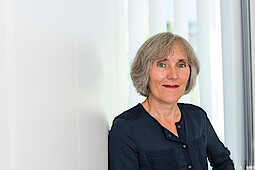Vaccination – A route out of the pandemic

A coronavirus vaccination protects both the vaccinated individual and others.

The number of coronavirus infections is currently sinking. Is it still even necessary that as many people as possible get vaccinated?
Prof. Dr. Ralf Reintjes: Absolutely! To protect themselves, and also so that everything doesn't start from the beginning again in the fall. As the virologist Christian Drosten says: in the end, everyone will be immunised, either through a vaccination or through an infection with the virus. The virus is so easily transmitted that everyone will come into contact with it sooner or later. And we can decide whether we choose a vaccination with mostly light side effects, or a direct infection which in many cases unfortunately progresses to serious illness or death.
Dr. Ursula Peschke: I have to agree. Both vaccinations are necessary. The first one helps in the short term, but the second one is necessary to make the immune system remember in the long term. This is the only way we'll leave the pandemic behind us.

What do you have to say to the sceptics?
Dr. Ursula Peschke: That is a good question. There are certainly people who are so convinced that a vaccination is harmful that they are completely closed to arguments to the contrary. But there are also those who simply feel uneasy about vaccines that have been developed so much more quickly than all previous vaccines and who want to understand exactly how they work and which risks we still might not be able to foresee. That is understandable. And with these people it is very possible to talk about the significant benefits of the vaccine relative to the possible risks.
When I was giving vaccinations at an old people's home at the start of the vaccination campaign, I was also offered a vaccination. My first thought was that I didn't necessarily want to be first in line. But of course I still got vaccinated, because after considering all the arguments the decision was clear.
Prof. Dr. Ralf Reintjes: That's probably true for everyone. Nobody really wants to be vaccinated right away. But now we have this virus and we won't get rid of it any other way in the near future, at least not without a lot of people dying or suffering the long-term effects of a corona infection. And the numbers are already showing that as the vaccination rate increases, fewer people get seriously ill or die, even when the rate of infection is still relatively high.
Should people take any opportunity to be vaccinated right now, even if they have concerns, for example, about being vaccinated with the AstraZeneca vaccine and it is not recommended for people under 60 in Germany?
Dr. Ursula Peschke: That is not so easy to answer and is always an individual decision. The risk of severe side effects from the AstraZeneca vaccine is also very low for people under 60, but for this age group there are also even safer mRNA vaccines. Given that younger people have a lower risk of experiencing a severe Covid illness, the Standing Committee on Vaccination (STIKO) recommends the mRNA vaccines for this age group.
But if a 58-year-old has the opportunity to protect themselves with the AstraZeneca vaccine now instead of waiting one or two months for an mRNA vaccine, that can be a sensible decision. In the case of an 18-year-old woman one might decide differently. What is important is a thorough explanation of the individual risks.
What exactly is the difference between the so-called vector vaccines and the new mRNA vaccines?
Dr. Ursula Peschke: Both are based on the same principle that we have used for a long time with vaccines: to put it simply, building blocks of the virus enter our cells and trigger an immune response. This then protects us when we do actually come into contact with SARS-CoV-2. In the case of the classical vector vaccines, such as AstraZeneca or Johnson & Johnson, this occurs with the help of a carrier, the vector, which stems from a real virus.
The AstraZeneca carrier is based on modified adenoviruses, which cause colds in chimpanzees but are harmless to humans. A small part of the genetic material from the new coronavirus is integrated into the DNA of these cold viruses and then transported into the body's cells via the vaccination. This genetic material initiates a series of processes that end with the cell producing the coronavirus spike proteins itself. This component of the virus trains the immune system to fight off an infection with the actual virus. The mRNA vaccines from Biontech and Moderna, in contrast, do not use DNA snippets but rather direct mRNA molecules, which are part of the process that takes place inside the cell as part of the vector technology.
Do we know how long the vaccination is effective and whether someone who is vaccinated can still be contagious?
Prof. Dr. Ralf Reintjes: We still don't know exactly how long someone is protected after vaccination. At the moment the research indicates that a vaccination definitely provides protection for longer than is the case for someone who has recovered from a coronavirus infection. People are likely protected for one year following both vaccine doses or the one-time dose of the Johnson & Johnson vaccination.
In terms of the risk of infection, initial studies in Israel with the Biontech vaccine have shown that vaccinated individuals are definitely far less contagious than those who are not vaccinated. But we still cannot assume that one non-vaccinated individual in a room full of vaccinated people – at a restaurant, for example – can absolutely not be infected. Caution is still called for here.
Will HAW Hamburg employees have the opportunity to be vaccinated?
Dr. Ursula Peschke: Hamburg's occupational health service, the Arbeitsmedizinische Dienst, is currently preparing to take part in the Covid-19 vaccination campaign. It is still unclear exactly how much vaccine will be made available and when, so a number of questions are still open here. Because the Covid-19 vaccine, especially the mRNA vaccine, is very sensitive and complicated to handle, vaccinations will likely take place at a central location.
Students in particular have had to endure a lot during this pandemic. When do you expect that they will be eligible for vaccination?
Prof. Dr. Ralf Reintjes: Unfortunately, students – and young people in general – are not on any kind of priority list. This isn't just extremely challenging for this group, which has really faced a lot of restrictions, it also doesn't really make sense from an epidemiological perspective.
The first step, naturally, was to protect especially vulnerable groups. But now we also have to think about who is potentially driving the pandemic. And young people usually have more contacts, travel a lot and are otherwise very mobile. This means the virus can spread easily. From my perspective this is why we should start vaccinating young adults and youths as soon as possible. At the moment, though, this is only possible through the general practitioners when they have leftover vaccine.
But I hope that by summer all students and potential students will also have been given the opportunity to get vaccinated so that the winter semester might even take place in a secure on-campus format again. In a recent survey of students in the departments of Health Sciences and Biomedical Technology, 88 per cent of those surveyed said they want to be vaccinated and 15 per cent had already been vaccinated. Those are encouraging numbers!
Thank you very much for the interview.
Interview: Maren Borgerding
